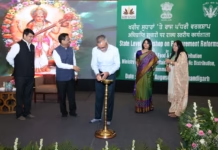Stubble burning menace; IIT Ropar brought stubble management solution
KI Singh/ royalpatiala.in/ Ropar
Paddy residue burning is a one facet of the crisis in our region. Farmers resort to the annual burning of paddy stubble and straw given the short window available for them to harvest paddy and prepare the field for sowing the successive wheat crop.
Since the advent of mechanized farming and growing labour shortage in the region, combined harvestors are used to harvest paddy which leave large quantities of stubble and straw as residue on the fields. Since rice straw doesn’t have any nutritional or commercial value, it is burnt. Given time constraints, problems with storing, in-field use and off- field disposal of the residue, farmers burn it to clear the field quickly and inexpensively. Due to this burning of stubble the quality of air is deteriorating day by day as a lot of gases such as CO, SOx and NOx are produced due to the burning of stubble.
“80% of paddy straw and 50% of wheat straw produced is being burnt in fields (. This causes high air pollution and reduces quality of the soil. To overcome stubble burning menace; IIT Ropar brought stubble management solution,” said, Prof. Harpreet Singh, dean ICSR&II, IIT Ropar and Principal Investigator of this project.
IIT Ropar has come up with the novel solution to this problem with a low cost Stubble removing machine. It removes stubble instantly and can be used just after harvesting with a combine. It can be operated with any tractor and cuts and collects stubble. It can be used both for removing rice and wheat stubble. It is very fast and requires only one person to operate. The cost of the system is about 5-6 lakhs. It is powered by tractor and added between tractor and trolley. The header part of straw reaper is used to cut the straws. The revolving reel pushes straws towards auger. The auger sends the straw to the conveyer chamber which takes the straws to the trolley for easy transportation. The collected straws are then taken out of the field and can be used to make manure.
“The machine can be mounted on a tractor trolley can chop the stubble up to a few centimeters from the ground and automatically load it into the trolley without any manpower saving labour and cutting down extra spending on diesel, which are the two main concerns being raised by the state farmers,” added Dr. Prabir Sarkar, Principal Investigator of this project.
To address this problem little further, IIT Ropar developed the stubble management system. An active self-sustaining stubble management system is created where each district can have a few of the above machine in a co-operative. For providing services android app and Interactive voice response system (IVR) will be used. The routing and scheduling of machine will be done automatically by the app. The orders can be given either by phone call or through android app. Farmers just need to give details of their field size and location and the app will give day and time to provide service to them.

The machine can be sent to various places to remove stubble as per the request of farmers. The stubble collected can be used to make fertilizer, burn in boiler to generate electricity or create acoustic/Ply boards.
“As these fires engulf the nation, IIT Ropar has stepped up to give low cost solution to the Government for implementation that will contribute to address significantly to the national capital’s air pollution woes, combating severe consequences for public health,” said Prof. Sarit K Das, Director, IIT Ropar.
The Project team comprises of Dr. Prabir Sarkar (PI), Prof. Harpreet Singh (PI), Fateh Singh (Project Assistant), Harmanpreet Singh (Project Staff), Moh Sahil (Btech Student), Jaswinder Singh (Lab Assistant), Randhir Singh (Lab Assistant), Girdhari Lal Sharma (Lab Assistant), KV Raju (Lab Assistant), Jaskaran singh (Lab Assistant). App is developed by two B.Tech students, Ankit and Praful.
Poor management of dust and no landscaping around roads leads to further circulation of dust in ambient air leading to higher pollution levels. On 4th November, it was declared Red Monday (HT, India Headline) due to highest farm fires records of 5953 in the State. In this season, total of 31,267 farm fires reported so far in the State which has contributed about 17.9% to 39.5% in the particulate matter air pollution in Northern Plains.













